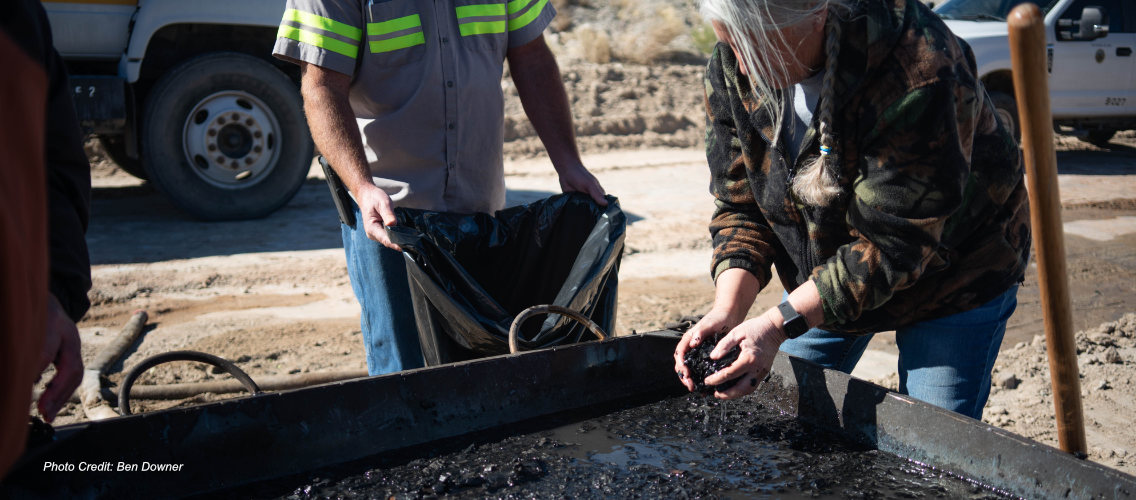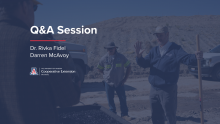
Biochar Workshop and Kiln Demonstration
Biochar commonly refers to charcoal made from organic wastes such as tree trimmings, scrap wood, and plant material left from agricultural harvests. Like a campfire, wood biomass will burn with no other external fuels or energy. Since burning wood does not add fossil carbon to the atmosphere, burning wood or making biochar is a carbon-negative process.
Held March 9 and 10, 2022 at Bullion Plaza Cultural Center & Museum and the Russell Gulch Landfill, this workshop showed using a flame cap kiln to produce biochar, highlighted biochar's potential to improve soil quality and sequester carbon and brought together stakeholders to discuss barriers and opportunities to developing biochar production.
How, When and Why to Use Biochar

Dr. Rivka Fidel, Assistant Professor of Practice, Department of Environmental Science with the University of Arizona tackles the questions of using biochar to improve soil quality and sequester carbon.
Using a Flame Cap Kiln to Make Biochar

Darren McAvoy, Forest and Wildland Resources Specialist with Utah State University Extension outlines how biochar kilns represent an accessible and durable approach to hazardous fuels mitigation and carbon sequestration.
Question and Answer Session

Dr. Rivka Fidel and Darren McAvoy answer audience questions about biochar and how to use the process effectively in Arizona.
Biochar Resources
Nebraska Forest Service Great Plains Biochar Initiative (GPBI) - improving biochar awarness and market development in the Great Plains.
New Mexico State Brewer Research Group - Working to transform waste materials into energy, clean weater and improved sustainability for agriculture. Their work focuses on slow pyrolysis and hydrothermal liquefaction conversion processes, extraction and separation of value-added co-products, adsorption for remediation of contaminants, biochar (biomass-derived char applied for soil quality and carbon sequestration), phytoremediation, brewing, and resilient food systems.
United States Biochar Initiative (USBI) - A not-for-profit organization promoting the sustainable production and use of biochar through research, policy, technology and application.
USDA Forest Service Wood Innovations Program - Expanding and creating markets for wood products and wood energy that support long-term, sustainable management of National Forest System lands and other forest lands. The program has two national competitive grants programs, as well as project activities funded under discretionary agreements and annual work plans.
USDE Forest Service Rocky Mountain Research Station - Developing and delivering scientific knowledge and innovative technologies with a focus on informing policy and land-management decisions. Researchers Deborah S. Page Dumroese and Nathaniel Anderson both work with biochar-related issues.
Utah Biomass Resources Group (UBRG) - Helping to build a sustainable biomass utilization industry in Utah. Increased wildfire activity across the western U.S. has increased the pace, scale and need for hazardous fuels reduction. Creating value for these millions of tons of waste wood is our highest priority. Sustainable biomass industries aid in promoting forest health, watershed protection, renewable resource utilization, and rural job development.
Go Biochar - Dedicated to the conversion of secondary biomass into biochar, a beneficial soil addendum, materials building block, and as a long-term method of carbon capture and sequestration for regeneration of ecosystems.
Trollworks - Using decades of experience in biomass and bioenergy systems development to offer a unique approach to BioEnergy + Carbon Capture & Sequestration (BECCS) that integrates all three of the known approaches to carbon sequestration. This solution set is based on a number of core design principles that are simultaneously the source of important technology system innovations.
Wilson Biochar - Providing technology, projects and training to help organizations reach their biochar project goals.

